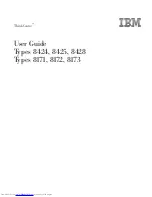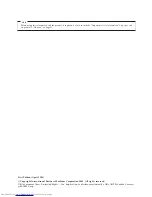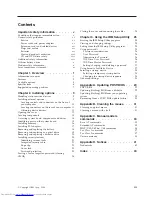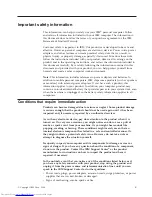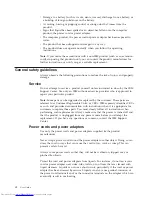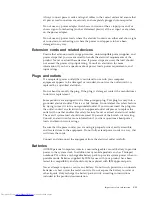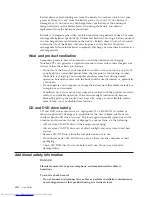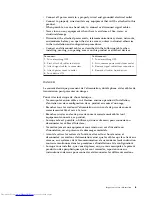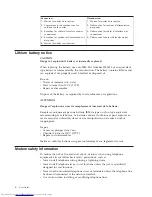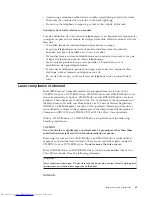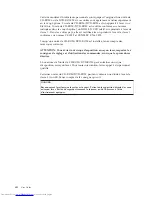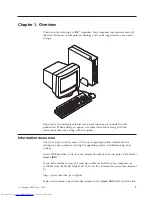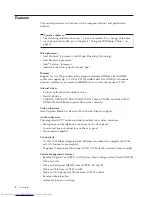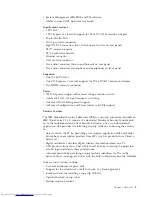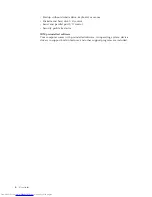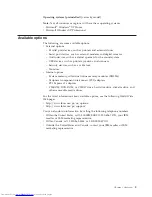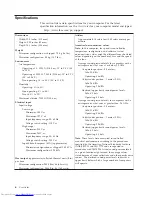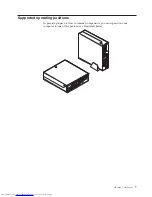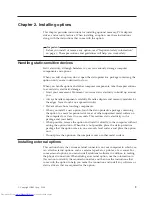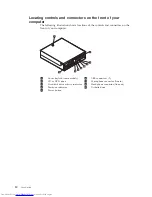
Battery
abuse
or
mishandling
can
cause
the
battery
to
overheat,
which
can
cause
gasses
or
flame
to
“vent”
from
the
battery
pack
or
coin
cell.
If
your
battery
is
damaged,
or
if
you
notice
any
discharge
from
your
battery
or
the
buildup
of
foreign
materials
on
the
battery
leads,
stop
using
the
battery
and
obtain
a
replacement
from
the
battery
manufacturer.
Batteries
can
degrade
when
they
are
left
unused
for
long
periods
of
time.
For
some
rechargeable
batteries
(particularly
Lithium
Ion
batteries),
leaving
a
battery
unused
in
a
discharged
state
could
increase
the
risk
of
a
battery
short
circuit,
which
could
shorten
the
life
of
the
battery
and
can
also
pose
a
safety
hazard.
Do
not
let
rechargeable
Lithium-Ion
batteries
completely
discharge
or
store
these
batteries
in
a
discharged
state.
Heat
and
product
ventilation
Computers
generate
heat
when
turned
on
and
when
batteries
are
charging.
Notebook
PCs
can
generate
a
significant
amount
of
heat
due
to
their
compact
size.
Always
follow
these
basic
precautions:
v
Do
not
leave
the
base
of
your
computer
in
contact
with
your
lap
or
any
part
of
your
body
for
an
extended
period
when
the
computer
is
functioning
or
when
the
battery
is
charging.
Your
computer
produces
some
heat
during
normal
operation.
Extended
contact
with
the
body
could
cause
discomfort
or,
potentially,
a
skin
burn.
v
Do
not
operate
your
computer
or
charge
the
battery
near
flammable
materials
or
in
explosive
environments.
v
Ventilation
slots,
fans
and/or
heat
sinks
are
provided
with
the
product
for
safety,
comfort,
and
reliable
operation.
These
features
might
inadvertently
become
blocked
by
placing
the
product
on
a
bed,
sofa,
carpet,
or
other
flexible
surface.
Never
block,
cover
or
disable
these
features.
CD
and
DVD
drive
safety
CD
and
DVD
drives
spin
discs
at
a
high
speed.
If
a
CD
or
DVD
is
cracked
or
otherwise
physically
damaged,
it
is
possible
for
the
disc
to
break
apart
or
even
shatter
when
the
CD
drive
is
in
use.
To
protect
against
possible
injury
due
to
this
situation,
and
to
reduce
the
risk
of
damage
to
your
machine,
do
the
following:
v
Always
store
CD/DVD
discs
in
their
original
packaging
v
Always
store
CD/DVD
discs
out
of
direct
sunlight
and
away
from
direct
heat
sources
v
Remove
CD/DVD
discs
from
the
computer
when
not
in
use
v
Do
not
bend
or
flex
CD/DVD
discs,
or
force
them
into
the
computer
or
their
packaging
v
Check
CD/DVD
discs
for
cracks
before
each
use.
Do
not
use
cracked
or
damaged
discs
Additional
safety
information
DANGER
Electrical
current
from
power,
telephone,
and
communication
cables
is
hazardous.
To
avoid
a
shock
hazard:
v
Do
not
connect
or
disconnect
any
cables
or
perform
installation,
maintenance,
or
reconfiguration
of
this
product
during
an
electrical
storm.
viii
User
Guide
Summary of Contents for 81712CU
Page 1: ...ThinkCentre User Guide Types 8424 8425 8428 Types 8171 8172 8173 ...
Page 2: ......
Page 3: ...ThinkCentre User Guide Types 8424 8425 8428 Types 8171 8172 8173 ...
Page 6: ...iv User Guide ...
Page 22: ...8 User Guide ...
Page 36: ... 22 User Guide ...
Page 54: ...40 User Guide ...
Page 59: ......
Page 60: ... Part Number 19R0474 Printed in USA 1P P N 19R0474 ...



